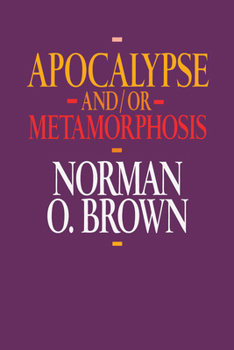Apocalypse And/Or Metamorphosis
Select Format
Select Condition 
Book Overview
Here is the final volume of Norman O. Brown's trilogy on civilization and its discontents, on humanity's long struggle to master its instincts and the perils that attend that denial of human nature. Following on his famous books Life Against Death and Love's Body, this collection of eleven essays brings Brown's thinking up to 1990 and the fall of Communism in Eastern Europe.
Brown writes that "the prophetic tradition is an attempt to give direction to the social structure precipitated by the urban revolution; to resolve its inherent contradictions; to put an end to its injustice, inequality, anomie, the state of war . . . that has been its history from start to finish." Affiliating himself with prophets from Muhammad to Blake and Emerson, Brown offers further meditations on what's wrong with Western civilization and what we might do about it. Thus the duality in his title: crisis and the hope for change. In pieces both poetic and philosophical, Brown's attention ranges over Greek mythology, Islam, Spinoza, and Finnegan's Wake. The collection includes an autobiographical essay musing on Brown's own intellectual development. The final piece, "Dionysus in 1990," draws on Freud and the work of Georges Bataille to link the recent changes in the world's economies with mankind's primordial drive to accumulation, waste, and death.
Brown writes that "the prophetic tradition is an attempt to give direction to the social structure precipitated by the urban revolution; to resolve its inherent contradictions; to put an end to its injustice, inequality, anomie, the state of war . . . that has been its history from start to finish." Affiliating himself with prophets from Muhammad to Blake and Emerson, Brown offers further meditations on what's wrong with Western civilization and what we might do about it. Thus the duality in his title: crisis and the hope for change. In pieces both poetic and philosophical, Brown's attention ranges over Greek mythology, Islam, Spinoza, and Finnegan's Wake. The collection includes an autobiographical essay musing on Brown's own intellectual development. The final piece, "Dionysus in 1990," draws on Freud and the work of Georges Bataille to link the recent changes in the world's economies with mankind's primordial drive to accumulation, waste, and death.
Format:Paperback
Language:English
ISBN:0520078284
ISBN13:9780520078284
Release Date:October 1992
Publisher:University of California Press
Length:250 Pages
Weight:0.66 lbs.
Dimensions:0.6" x 5.5" x 8.2"
Related Subjects
Criticism & Theory History History & Criticism Philosophy Politics & Social Sciences WorldCustomer Reviews
1 rating
With Gog and Magog right in the middle.
Published by Thriftbooks.com User , 22 years ago
This is a book which seeks a place for humanity in the poetic extremes of intellectual life. Near the end, "Dionysus in 1990," Georges Bataille, author of THE ACCURSED SHARE, gets credit for writing, "Religion is the satisfaction that a society gives to the use of its excess resources, or rather to their destruction." (p. 188). With the thoroughly modern economic ploy of monetary expansion in the late 20th century, the progress of humanity was based largely on the willingness of everyone to engage in deep play, in which "The game that is played with the surplus is gambling, with a built-in risk of self-destruction, a built-in need for competition, and a built-in demand for new goods to replenish the store and be in turn destroyed (as in `planned obsolescence'). A need for hemorrhage is built into the system." (p. 187). This is a culmination of the intellectual approach in these essays, from the years 1960-1990, and, as the Preface puts it, looking back is "partly retrospective, at the end of an era." (p. ix).APOCALYPSE AND/OR METAMORPHOSIS begins with an outstanding Phi Beta Kappa Speech delivered at Columbia University on May 31, 1960. Already on page 2, this book declares, "Resisting madness can be the maddest way of being mad." Religion is considered "the learned ignorance, in which God is better honored and loved by silence than by words, and better seen by closing the eyes to images than by opening them." (p. 3). The second selection in this book is aphoristic. "Daphne, or Metamorphosis." It seems to be about poetry. "Petrarch says that he invented the beautiful name of Laura, but that in reality Laura was nothing but that poetic laurel which he had pursued with incessant labor." (p. 10). Similarly, the next section considers Sir John Falstaff in Shakespeare. "The horn, the horn, the lusty horn, Is not a thing to laugh to scorn." (p. 37).The fifth section of the book, "The Prophetic Tradition," is an attempt at "Ecumenical prophetic history," (p. 47), which is contrasted with "Hegelian triumphalism." (p. 47). Islam is seen as part of the prophetic tradition. "Protestants should be able to see that the need for a Protestant Reformation was there already in the seventh century C.E., to be perceived by prophetic eyes. Blakeans should be able to see that there is no way to accept `Again He speaks' in Blake unless we accept that again He speaks in the Koran." (p. 48). The anti-philosophical attempt by Justinian to purify Christian doctrine by closing the schools of philosophy in the year 529, and Christian opposition to the Gnostic Judaeo-Christian heresy "which struggled to avoid the catastrophic rupture between Christianity and Judaism" (p. 49) is the background for Norman O. Brown's philosophical attempt to conclude, "Islam is to be envisaged as dialectical evolution, or evolutionary mutation, in the prophetic tradition, in response to the limitations built into the structure of orthodox Christianity by its compromise w





